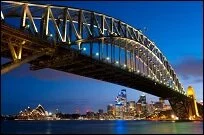With the arrival and settlement of the Europeans in the 1600-1700s, many of these aboriginal people died and with them their languages and cultures were lost. However, many others, particularly those in the deserts, survived and maintain their traditions, languages, and culture today to varying degrees.
European settlement on the island was slow at first since the British saw little economic value in the lands. However, in the late 1700s immigration began in larger numbers, especially in the form of criminals as the lands became a penal colony. However, a free colony was also established as the lands grew in various forms, with different cultures and lifestyles. The aboriginals continued to live off the land in the country's interior, as many of the Europeans were heavily urbanized and lived a lifestyle similar to that of Britain, although foods and other goods weren't as easily accessible. Additionally, the landscape and weather demanded alterations in the culture from that of Britain, which began the slow development of Australian culture.
Since the arrival of these early European settlers, and later settlers, including many from Asia's Far East, the culture has continued to develop and change. However, the people remain fairly urbanized and most people live near the coasts. This has allowed the aboriginal culture to survive in the country's interior and today there is a growing understanding and integration of these cultures into Australian culture. However, Australian culture is still heavily rooted in British and European culture as most people speak English, are Christian, and use modern technology and communication as the country is a world leader in many ways.
Articles
| |

Top Tourist Destinations in Australia
By Amber Rosh
November 2, 2014
Australia is full of unique destinations that will leave you with lifelong memories. Seemingly everything in Australia is a tourist attraction: beneath the waters, on the land, and in the skies above. Here are some of my top Australian destinations:
Fraser Island: Located off the eastern coast of Australia:... Continue Reading
|
|